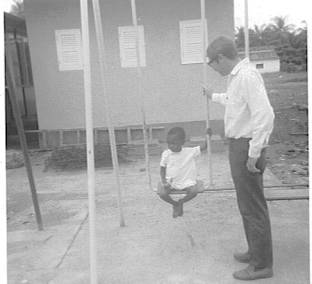WID Biafran Children
From Rpcvdraft
The World Is Deep - Continued
Biafran Children David L. Koren, Nigeria 9 (1963-1966) March 2007
There was a place I went, a stretch of beach where I could be alone. One clear tropical night I watched across the bay as an aircraft landed, an aircraft took off. I heard the sound of distant engines and the spill of the gentle surf. Moonlight glinted along the curl of the breakers. I became aware of another sound, a scratching, a scurrying. Off to my right was the body of a dead pig, rocking back and forth in the waves. It was covered with crabs, devouring it. Maybe in everything beautiful that there is, somewhere in it there is a dead pig.
Evacuated children were taken to a convent called San Antonio. After a week they could sit up, and they could feed themselves. I went to see them. As I came into the compound, about a dozen of them ran to my side. They walked with me, and one of them held my hand.
I asked a boy where he was from. “Ebee ka i si?”
“E si m Emekwukwu biya.”
“Do you know why you are here?” I asked.
“Boota Gowon.”
“What?” “Gini?” “Boota Gowon!” He pointed to his foot and made a kicking movement. Gowon had kicked him out.
A Nun told me a story about one of the children. He led a protest against a particular spread the kids didn’t like on their bread. At his signal all the children put down their bread and stopped eating. Some of the very young ones were reluctant to do this, but they went along. They won, and they were not served peanut butter again.
You never win, if you give up when things are easy.
Someone said that the airlift prolonged Biafra’s agony by bringing false hope. Without food for their people the leaders would have given up sooner. It sounds like a bad idea whose time had come, an idea that someone put forward and many others adopted without thought, a piece of facile wisdom. It makes sense if you don’t stop to think about. In fact, if you accept the idea, you can stop thinking altogether – no need to consider the complexities.
The idea can be accepted by people with no personal, immediate concept of large scale random killing. They have not seen gangs running through their neighborhoods, dragging people out on the street and chopping them up. Biafran people saw the trains full of refugees pouring in from all over Nigeria. They accepted those refugees into their homes and villages. And they heard their personal, immediate stories.
A people who know they are facing genocide do not give up. Israelis say, “Never Again.” An old Igbo proverb says, “Only a tree stands still when it knows it’s being cut down.”
Another dimension, beyond security, for continuing the fight, is the concept of freedom to control one’s own destiny – not just to avoid disaster, but to build a positive future. In the shrinking Biafran enclave was the highest concentration of Ph.D.s in all of Africa. Biafrans “know book,” and that got them in trouble in other parts of Nigeria and was partly responsible for the killings. The motivation to learn and to grow into a modern society kept Biafra going. That was also a motivation for their neighbors to keep them down.
As long as there was a possibility of winning, they continued the fight. Until they just couldn’t. Perhaps the Bravo Charlie Whisky mission to Addis Ababa was not about negotiating an end to the war, but about finding support to continue. Whichever it was, it failed.

